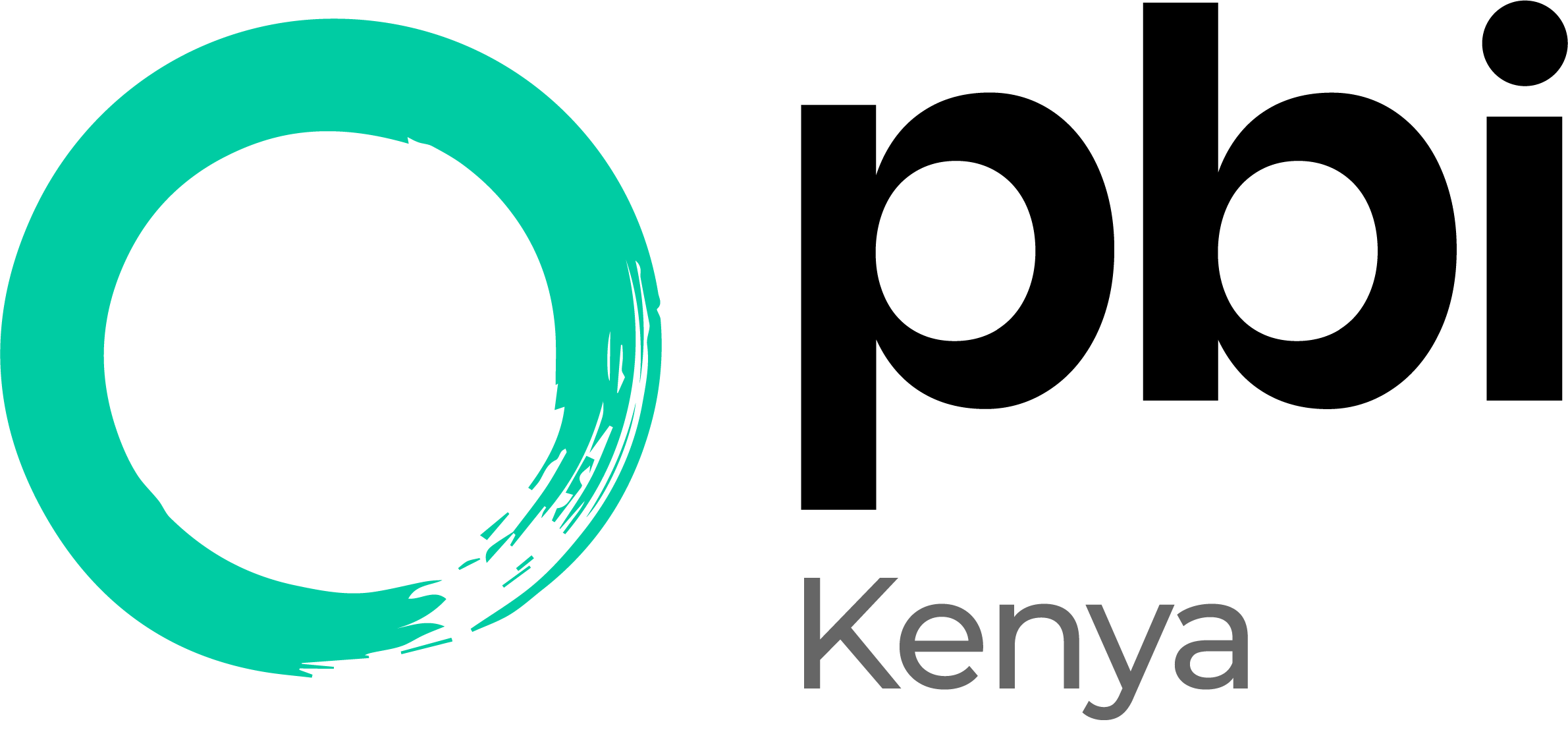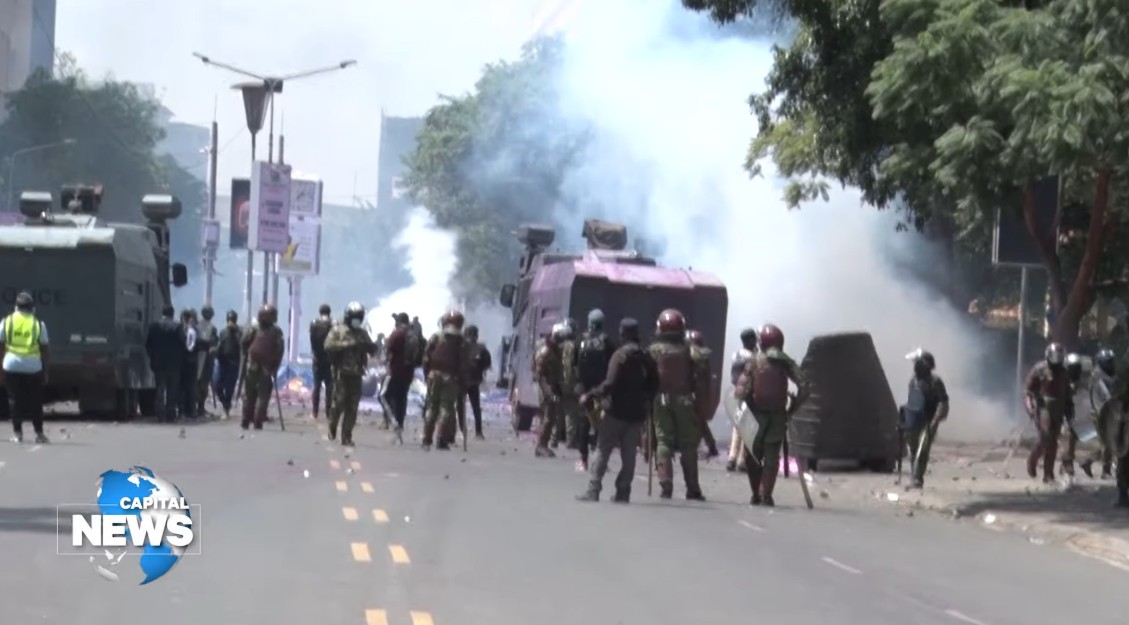
We are at the one-year anniversary of the protests in Kenya against the Finance Bill, widely known as #RejectFinanceBill2024.
The legislation was introduced by the Kenyan government on May 13, 2024, online protests began soon after on May 18, that then evolved into protests on the streets of Nairobi that began on June 18, the President then declined to sign the legislation on June 26, and protests continued throughout July and into August 2024. The Guardian has also explained: “In June 2024, protests erupted in Kenya’s capital. They were triggered by a draft finance bill that proposed tax hikes on essential items, increasing the burden on citizens already struggling through a cost of living and inflation crisis. …The protests were peaceful, with songs, placards and chants. But politicians dug their heels in, and the police began to use water cannon, release teargas and shoot into the crowds. …Brute repression not only did not work, it inflamed tensions.”
Now, BBC reports: “Leading human rights organisations have renewed calls for investigations into the killing of protesters by Kenya’s security forces during demonstrations against a rise in taxes last June.”
That article adds: “BBC Africa Eye’s Blood Parliament documentary revealed how security forces brutally responded to youthful protesters who breached Kenya’s parliament on 25 June 2024, the day lawmakers voted to approve the proposed tax hikes.”
That 37-minute documentary can be seen here.
Tear gas
On May 12, 2025, the Israeli newspaper Haaretz reported: “Tear Gas Made in Israel Has Been Used to Violently Suppress Protests in Africa.”
The Omega Research Foundation notes: “Our open-source research revealed that security forces used tear gas grenades, most of which, we believe, were manufactured by ISPRA Ltd, an Israeli company specializing in developing and manufacturing devices for riot control, crowd management, anti-terror equipment, and police gear. ISPRA’s products include tear gas grenades, anti-riot guns, and various types of ammunition, some of which have been used by security operatives in the Kenyan protests.”
Their research concludes: “As Israel leverages its expertise in surveillance and crowd control technologies for diplomatic and economic gains in Africa, concerns grow about the potential consequences. The deepening of dictatorships and weakening of democracy across the continent can no longer be ignored. In light of these developments, it is imperative to critically examine how Israel’s involvement in African security matters might be impacting the political landscape. The increasing use of Israeli-supplied crowd control equipment, such as tear gas, not only affects public health but also influences the dynamics of civil unrest and state responses. This calls for a nuanced understanding and rigorous scrutiny of the long-term consequences of such exports on the democratic fabric and human rights conditions in African countries.”
The Who Profits Research Center has also explained: “Ispra is a private Israeli company that manufactures and markets non-lethal weapons and gear for crowd control and suppression. The company manufactures a range of products including rubber bullets, tear gas, stun and smoke grenades, and non-lethal guns and launchers. The company also manufactures equipment to military, police and homeland security agencies.”
PBI-Kenya
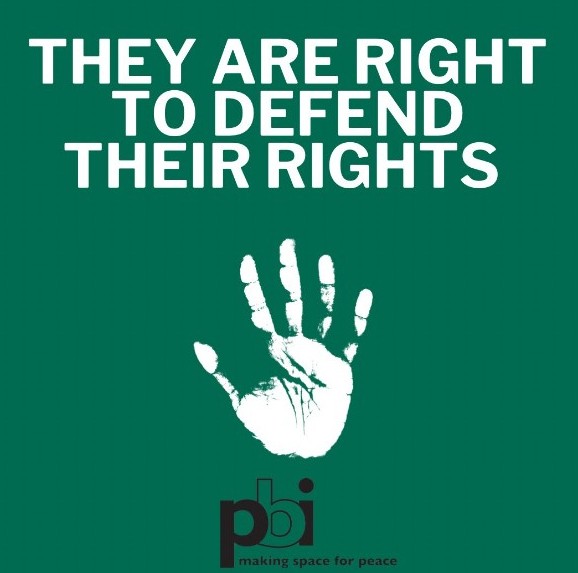
In May 2024, Peace Brigades International-Kenya coordinator Alberto Fait commented: “Marching against tear gas to exercise constitutional rights requires courage. Making changes requires courage.”
By July 17, 2024 ,PBI-Kenya had signed a statement with other organizations that urged the investigation and prosecution of “police officers and their commanders who have violated Kenyans’ rights during the ongoing protests. It remains a matter of public concern that no single officer, as yet, has been arrested for the arbitrary arrests, abductions or unlawful killing of Kenyans in recent weeks.”
Missing Voices
The Missing Voices report published earlier this month also notes: “Missing Voices is a coalition of human rights organizations whose mission is to end enforced disappearances (EDs) and extrajudicial killings (EKs) in Kenya. …Since the release of the first report in 2019, Missing Voices has documented 970 incidents of enforced disappearances and extrajudicial killings over the last 6 years. These include 167 incidents of enforced disappearances and 803 incidents of extrajudicial killings.”

The report provides this chart that suggests most of the extrajudicial killings in Kenya are committed by the national police. A significant additional question may be what countries and companies supply the weapons used in these extrajudicial executions.
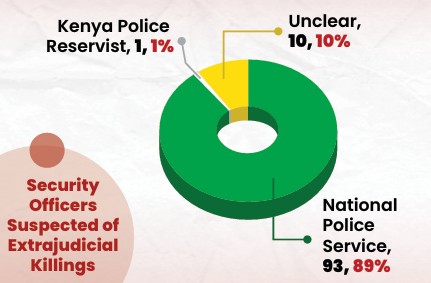
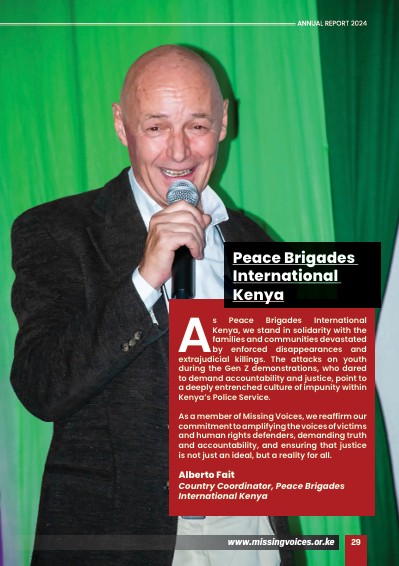
CANSEC arms show, May 28
It is possible that Kenya will be one of the 50+ international delegations that will be present at the CANSEC arms show in Ottawa this coming May 28-29.
That list is not made publicly available by the organizers of CANSEC and a previous request to Global Affairs Canada by PBI-Canada in June 2022 asking for the names of the delegations attending CANSEC was never answered.
We remain attentive to this issue.
Published by Brent Patterson
